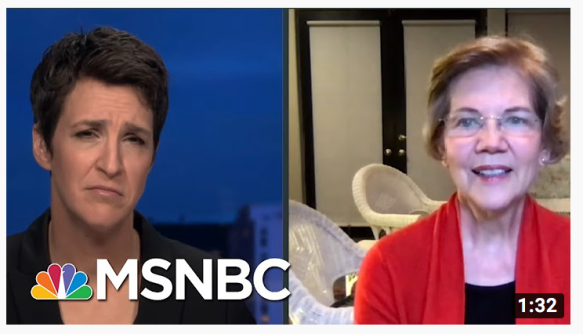
It took just one word for U.S. Senator Elizabeth Warren to create a “breaking news” moment, yet leave the interviewer unsure where to go next.
On the day Warren endorsed Joe Bidden as the Democratic candidate for president, she appeared on Rachel Maddow’s show on MSNBC.
After asking questions about Warren’s own now-concluded campaign for the nomination, Maddow asked a question that logically flowed from previous questions about the senator’s decision to endorse Bidden.
“If he asked you to be his running mate, would you say yes?”
Elizabeth Warren’s answer was simple and direct.
“Yes!”
The senator’s unambiguous, honest response was clearly not what Maddow expected. There was an awkward pause before the journalist said, “I am so happy you gave me a concise answer to that.”
Then she did the only thing she could do under the circumstances—go to a commercial break (i.e. time to regroup before continuing the interview).

Click here to view interview on YouTube
This moment illustrates why questions requiring only a single word response—known as “closed” questions—should not be asked.
When it only takes one word to fully answer a question—whether from a reporter or from a manager during a hiring interview—it leaves the person who asked the question with nowhere to go. It’s over. The question was asked and answered.
Of course, those who ask closed questions anticipate hearing more than the single word that is required as a response.
Journalists expect politicians to provide long, ambiguous responses that fall short of answering the question. For example, they feel “humbled” or “honoured” to even be considered and acknowledge that “there are so many qualified people Joe could choose from.”
Certainly, those conducting hiring interviews expect to hear more than yes or no when they ask candidates, “Do you believe that teamwork is important?” or “Are you able to work without supervision?”
No one should fault someone for answering a question in the fashion it was asked. You should be asking better questions that require candidates to provide the detail you require to be able to make decisions that will result in the hiring of the right person to fill your vacancy.
“Describe how you contributed as a member of a work team.”
“Tell us about a time when you worked without supervision.”
During my “Unlucky” When Hiring?” breakout program at conference and convention breakouts, I begin by explaining why my two “co-presenters” were unable to be there. These explanations come down to mistakes I made when I interviewed them, which led to the wrong hiring decisions.
Part of the reason I didn’t hire “Annie” was because I asked questions that could be answered with a single word, which she did.
I blamed her for not understanding that even though I asked closed questions, she should have known I wanted her to tell me more.
If she had, I might have offered her a position. Luckily, she was able to get a second interview with someone else in the organization, who did hire her. She turned out to be a top performer, unlike “Willie” who turned out to be a disastrous hire.
Before your next interview, review the questions you plan to ask. Could they be answered with a single word? These questions should be rewritten to require detailed answers that will provide you with high-quality data required to make the right hiring decisions.
Remember, you won’t have the option of taking a commercial break if a single word answer brings the interview to a grinding halt.
Image Credit: http://www.bigstockphoto.com
